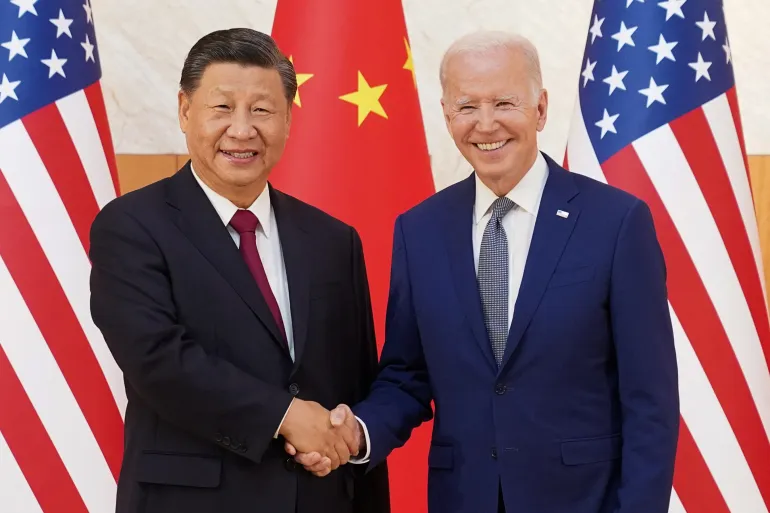U.S. presidents meeting foreign leaders involves complicated arrangements. San Francisco will host the APEC meeting this year.

The APEC summit from the previous year was held in Bangkok, Thailand. (Source: APEC)
On Wednesday, President Joe Biden will meet Chinese leader Xi Jinping. No detail will be overlooked. Any meeting between the president and a foreign leader requires delicate political and cultural logistics, and any event or statement might upend the world order. Few nations are more etiquette-conscious than the Chinese, and Washington and Beijing’s often-conflicting agendas may make the trivial meaningful. There’s definitely “very detailed planning of the actual choreography of who enters a room where, if there will be pictures taken and all of that,” said Bonny Lin, Center for Strategic and International Studies senior scholar for Asian security and China Power Project director.
Biden and Xi will meet during next week’s Asia-Pacific Economic Cooperation conference in San Francisco. Basic information has been kept secret. Friday’s Chinese government statements didn’t name the day or place. Due to security concerns, the White House simply says the meeting would be “in the Bay area.” Both sides may argue over meeting length and who enters first, which could heighten tension. Senior administration officials say they will schedule multiple meetings for in-depth discussions on topics. That recalls Biden’s nearly three-hour discussion with Xi before last year’s G-20 summit in Bali. The authorities also underlined that this will be Xi’s first trip to the US in six years and to San Francisco since he was a provincial Communist Party secretary.
APEC is easier to organize than a formal site, according to former White House National Security Council director for Asian Affairs Victor Cha. He claimed summit side talks are still “a logistics nightmare.” The Chinese usually demand everything when they visit the US. They want all the fanfare. Cha said they want the most respect imaginable. It’s politically impossible. In San Francisco, APEC is not hosted by the White House, solving that dilemma.” Informal settings can be high-stakes. In 1972, President Richard Nixon visited China to alleviate decades of antagonism and climbed the Great Wall in rubber shoes. President Obama and Xi didn’t wear ties at their 2013 meeting at Sunnylands, a modernist house in Rancho Mirage near Palm Springs. Obama’s overnight stay while the Chinese group returned to a nearby hotel was news then.
READ ALSO: US Decoupling From China Could Possibly Result to Disaster
Other Projections During APEC Summit
The Chinese value the location, which may be Sunnylands rather than Anchorage, Alaska, where top U.S. and Chinese officials held acrimonious 2021 negotiations. The weather may be a proxy for bilateral ties in Chinese state media. Early projections predict rain and mid-60s highs for San Francisco. Chinese culture values harmony, therefore even on-site flowers may matter. Plum blossoms are loved in China for their resilience, while lotuses symbolize serenity. By contrast, chrysanthemums symbolize death. Xi may expect a Biden welcome. Xi’s team may want the leaders pictured sans staff to show a personal relationship.
“Chinese officials will want to project to their domestic audience that Biden receives Xi with dignity and respect,” said Brookings Institute John L. Thornton China Center director Ryan Hass. He suggested an “imagery of both leaders interacting on a personal basis, beyond the customary handshake in front of a bank of flags in a hotel conference room.” That may be a brief walk together, Hass added. Chinese stress eating and may insist on a meal. Nixon’s 1971 visit began with a military honor guard at the airport, but the much-watched toasts from both sides came after a shark fin dinner. In 1989, China hosted a Texas-style BBQ at a fancy Beijing hotel for President George H.W. Bush but refused to invite Fang Lizhi, the country’s most prominent dissident.
The APEC setting prohibits formal dinners. But lunch is conceivable. According to a 2017 Chinese documentary on diplomatic ethics, Xi schedules his trips down to the minute and often packs so much in that there’s no time to eat. Never-ending security concerns plague both sides. Obama said in his memoir of his 2009 China trip that his team was “instructed to leave any non-governmental electronic devices on the plane” and assumed “that our communications were being monitored” and hotel rooms had concealed cameras. In 1995, Hillary Clinton claimed that “human rights are women’s rights, and women’s rights are human rights.” In 2008, then-first lady Laura Bush stopped in Thailand to visit a refugee camp for Myanmar refugees before going to the Olympics in Beijing. Protocols for U.S.-China leader talks don’t always include espionage or human rights.
The trip included a toboggan ride away from the press following a Great Wall visit and a table tennis session where Michelle Obama joked that her husband “thinks he’s better than he is.” The outcome felt stiff to some. The New York Times headlined “Even With Ping-Pong, a Formal Meeting in China.”
READ ALSO: China Continues to Support Subnational and People-to-people Exchange with US

















































